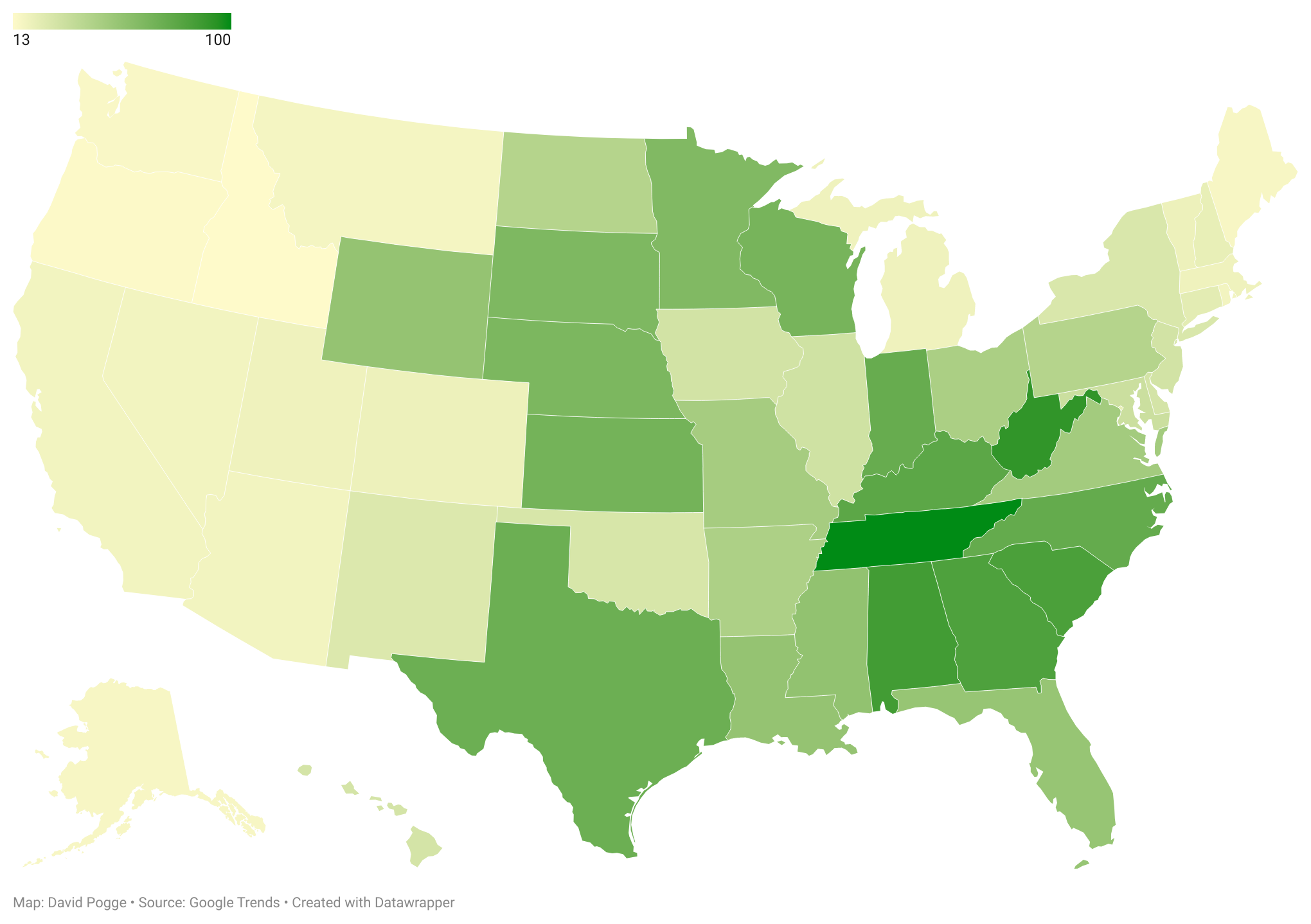The Federal Government, despite all logic and evidence, still holds that marijuana is a Schedule 1 drug with no accepted medical applications. In response, dozens of states have one by one, thumbed their nose at the feds and legalized the plant for adult consumption.
The Federal Government, despite their draconian stance on marijuana, accidentally legalized intoxicating hemp cannabinoids, namely Delta-8 THC. In response, dozens of states have one by one, thumbed their nose at the feds and banned the compounds for adult consumption.
We live in the upside down.
Even more dizzying—or maybe telling—is the plausible correlation between states that have fully legalized the plant and states that have banned hemp-extracted THC isomers. It’s not an exact match, but the parallels between the legalization maps are hard to overlook. One appears to be the relative inverse of the other.
Is this a “follow the money” situation? Perhaps. Perhaps even maybe.
One legal state where the fate of hemp-derived THC isomers appears yet to be determined is Arizona, and the developing situation there is telling. There are two competing bills currently in the legislature.
The first to emerge was Senate Bill 1271, which, with the blessing of the hemp industry, would establish regulations for the production, processing, manufacturing, distribution, and commerce of industrial hemp and hemp-derived products in the state.
It didn’t take long for a competing bill to show up, this one backed by the state’s legal marijuana industry. Senate Bill 1453 would prohibit the sale of these compounds by any individual or business, except for licensed dispensaries.
At this juncture, the data alone is insufficient to draw conclusions. But as we’ve compiled the data for this installment of our series, a pattern has emerged that begs exploration. We’ll continue to take that plunge and report what we find in future issues. For now, though, we’ll refrain from drawing conclusions, lest we slip too far down the rabbit hole of conjecture and innuendo. That’s what cable news is for.
In last month’s installment, I promised a deeper follow-up piece on the subject at hand, one that would source quotes from the experts and hopefully clear up some of the confusion surrounding the compounds. That piece is still in the works, but after looking into the data, we decided as a team that there was a more pressing aspect to cover.
The hemp-derived THC market is quickly shrinking, not by waning interest of the consumer, but through prohibitive legislation. In the two months we’ve explored this topic, three more governors have signed bills banning hemp THC products, while new bills seem to show up in state houses almost weekly.
In this month’s edition, we’ve thoroughly examined the legality of hemp-derived THC isomers across each state, presenting our findings in what we hope is a digestible format. This includes a color-coordinated map detailing the legal status of these compounds, combined with a clear description of the legal scenario in states where their legality is in question.
But before we get that, there are a few disclaimers and clarifications that must be made.
- This is not legal advice. We cannot express this enough. The contents of this article should not be used by anyone to determine whether it’s safe to carry psychoactive hemp-derived cannabinoids in any particular state. To effectively determine legality in your state or municipality, consult with your lawyer. To get a big-picture grasp on the emerging trends and patterns of this topic, consult with us.
- We mentioned this last issue, but it bears repeating: Legality is rarely black and white. Laws are often written ambiguously, subject to infinite interpretations, and only clarified when a court steps in with a ruling. Legal status is determined by more than a simple “yes” or “no” handed down by legislatures. We must consider regulatory directives, reinterpretations, court precedents, and varying jurisdictions that may or may not contradict one another.
- There is a good chance that by the time this issue hits your mailbox, our map will be obsolete. Once again, use this for reference and entertainment purposes only.
- Finally, you may disagree with some of our conclusions—and that’s OK. In fact, we may have gotten it wrong in one or two instances. These issues are not black and white; the information available for each state is a labyrinth of contradictions. It is highly likely that Delta-8 and related products are being openly sold in more than one state we colored red. It is also possible that raids have occurred in states we colored green.
Legality of Hemp-Derived Delta-8 THC by State as of June 1, 2023

 Alaska
Alaska
In Alaska, medical and recreational marijuana are legal, while hemp-derived CBD is regulated, requiring licensing and testing to ensure below 0.3% THC content. However, per Alaska Statutes Sec. 7. AS 11.71.900(14), all “tetrahydrocannabinols” including Delta-8 THC and other isomers like Delta-10, HHC, and THC-O are classified as Schedule IIIA, rendering them illegal. Purchase, possession, distribution, marketing, production, and online retail of Delta-8 products are prohibited.
 Arizona
Arizona
There are multiple sources online and elsewhere that state that hemp-derived Delta 8 and related products are illegal in Arizona. However, according to both Axios and AZCentral, the compounds are being sold openly throughout the state. There are currently two bills in the legislature intended to deal with the issue; Senate Bill 1271 and Senate Bill 1453. The former would regulate hemp products, while the latter would limit the sale of hemp-derived cannabinoids to licensed cannabis dispensaries.
 Arkansas
Arkansas
Arkansas state lawmakers passed Act 629 (Senate Bill 358) prohibiting a series of psychoactive compounds, including Delta-8. The law, signed by Gov. Sarah Huckabee Sanders on April 11 of this year, comes despite the 2018 Congressional legalization of hemp, which contains 0.3% or less Delta-9 THC, and the subsequent boom in industrial hemp products.
 California
California
California’s Assembly Bill 45 (AB-45), signed by Governor Gavin Newsom, permits hemp and hemp-derived products containing up to 0.3% THC in foods, beverages, dietary supplements, cosmetics, and pet food. However, it also redefines “THC” to include THC isomers like Delta-8 and Delta-10, excluding non-intoxicating cannabinoids such as CBD. While this allows for the production and sale of hemp-derived products, it places Delta-8 companies in a regulatory grey area due to the state’s yet to be established framework for Delta-8 products.
Delta-8 Search Rates by State According to Google Trends Dec. 20, 2018 – Present
 Colorado
Colorado
In May of 2022, the Colorado Department of Public Health and Environment released a legal notice, stating that chemically modifying or converting any naturally occurring cannabinoids from industrial hemp is non-compliant with the statutory definition of “industrial hemp product.” This includes any process that converts an industrial hemp cannabinoid, such as CBD isolate, into Delta-9, Delta-8, Delta-10-THC, or other tetrahydrocannabinol isomers or functional analogs.
 Connecticut
Connecticut
Senate Bill 1201, the measure that legalized adult use Cannabis in Connecticut amended the legal definition of hemp by expanding THC definitions to include “Delta-7, Delta-8-tetrahydrocannabinol, Delta-9-tetrahydrocannabinol and Delta-10- tetrahydrocannabinol, and any material, compound, mixture or preparation which contain their salts, isomers and salts of isomers.” As a result, Delta-8 products can only be purchased from state-licensed cannabis dispensaries, a fact reinforced by warning letters sent out by Attorney General William Tong to multiple retail outlets regarding the sale of the compound.
 Delaware
Delaware
Under the Delaware Controlled Substances Act (CSA), any substance, mixture, or synthetic equivalent containing any quantity of tetrahydrocannabinol (THC) or marijuana, including their isomers and salts, are prohibited. Hence, in Delaware, all forms of THC and marijuana are classified as Schedule 1 substances.
 Georgia
Georgia
The situation in Georgia is a mess. There is a strong case to be made for the legality of Delta-8 products, but it hasn’t stopped law enforcement from raiding several retail outlets engaged in the sale of the compound. A Fulton County judge initially issued injunctions against Delta-8 prosecutions, but that has since been reversed by the state supreme court. Meanwhile, a bill to determine the compound’s fate has stalled after passing the Senate.
 Hawaii
Hawaii
Hawaii’s Department of Health clamped down on hemp products in August 2021 with a set of interim rules that banned the sale of inhalable and edible variants, including trendy Delta-8. The rule was exhaustive, covering everything from flowers to vapes, drinks, and even items for ocular, nasal, or aural use. In February 2022, the island state further tightened its grip by extending the ban to all isomerized cannabinoids such as Delta-8, Delta-10, HHC, and THC-O.
 Idaho
Idaho
While the US broadly embraced hemp-derived products post the 2018 Farm Bill, Idaho stubbornly stood apart, outlawing all THC levels. It wasn’t until April 2021 that it permitted hemp production with House Bill 126, which also labeled THC isomers like Delta-8 as Schedule I controlled substances. For a state with a long-standing resistance to THC, Idaho’s complete ban on Delta-8 in any product, whether hemp or marijuana-derived, comes as no surprise.

 Indiana
Indiana
Delta-8 products are technically legal in the Hoosier state, but it gets an asterisk, as smokeable hemp flower is expressly banned.
 Iowa
Iowa
Iowa has not passed any laws specifically banning Delta-8, but the state Attorney General has chosen to interpret existing law to mean that the compound is illegal by default, as there is a specific mention of “THC” meaning total tetrahydrocannabinol in their hemp bill. Moreover, consumable hemp products are tightly regulated by Iowa’s Department of Inspection and Appeals, while smokeable hemp flower is banned altogether.
 Massachusetts
Massachusetts
Statement from Massachusetts.gov: “Because Delta-8 THC is not naturally occurring in hemp (except for possible trace amounts), to produce Delta-8 THC in commercial quantities it must be derived from hemp synthetically. While the Farm Bill did remove hemp from the Controlled Substances Act, it did not impact the control status of synthetically derived cannabinoids, thus Delta-8 THC remains a controlled substance, regardless of the source. As a result, we do not allow hemp-derived Delta-8 THC products to be processed or sold in Massachusetts.”
 Michigan
Michigan
In July of 2021, Governor Gretchen Whitmer signed a law requiring all Delta-8 products to be regulated like traditional marijuana products. Effective October 21, 2021, all Delta-8 products must be regulated by the Michigan Cannabis Regulatory Agency and obtained only through a licensed dispensary.
 Mississippi
Mississippi
Senate Bill 2725, Mississippi’s hemp legalization effort, very specifically states that their definition of THC includes all possible forms: “Tetrahydrocannabinols, meaning tetrahydrocannabinols contained in a plant of the genus Cannabis (cannabis plant), as well as the synthetic equivalents of the substances contained in the cannabis plant, or in the resinous extractives of such plant, and/or synthetic substances, derivatives, and their isomers with similar chemical structure and pharmacological activity to those substances contained in the plant…”
 Montana
Montana
Montana’s hemp law reform embraces CBD but halts at THC. The state classifies “marijuana” as any cannabis plant material with THC, and without exception, categorizes all THC types, including those from hemp, as Schedule I Controlled Substances. Only Delta-9-THC, under 0.3% on a dry weight basis, is tolerated. As it stands, Delta-8-THC remains illegal in Montana.
 Nevada
Nevada
Nevada Senate Bill 49 clarifies the definition of “THC” in their hemp statute to mean all isomers of the compound, including Delta-8. Thus, any product containing Delta-8 can only be produced and sold within the regulatory structure of the state’s legal cannabis regime.
 New York
New York
Section 114.8 of New York’s Hemp Cannabinoid Regulations specifically prohibits any product that contains “synthetic cannabinoids, or cannabinoids created through isomerization, including Delta-8-tetrahydrocannabinol and Delta-10-tetrahydrocannabinol.”
 North Dakota
North Dakota
In 2021, North Dakota amended their hemp legalization bill by deleting the term, “Delta-9” that proceeded the word “tetrahydrocannabinol” in the passage that set the limits of THC in industrial hemp. In the same amendment, they went on to define “tetrahydrocannabinol” as “Delta-9-tetrahydrocannabinol and any structural , optical, or geometric isomers of tetrahydrocannabinol, including: Delta-7-tetrahydrocannabinol; Delta-8-tetrahydrocannabinol; and Delta-10-tetrahydrocannabinol.
 Oregon
Oregon
Per the OLCC, “An industrial hemp product may not contain any artificially derived cannabinoids.” According to the board, an “’Artificially derived cannabinoid” means a chemical substance that is created by a chemical reaction that changes the molecular structure of any chemical substance derived from the plant Cannabis family Cannabaceae.”
 South Carolina
South Carolina
While many hemp advocates and retailers claim Delta-8 products are legal in the Palmetto state, the Attorney General would beg to differ. “We believe,” he wrote, advising the South Carolina Law Enforcement Division, “that a court would hold that the Hemp Farming Act does not provide an exception for, and does not legalize Delta-8 THC or any other isomer of THC in itself. Section 44-53-190(D)(18) (2018) categorizes all isomers of THC as Schedule I controlled substances “unless specifically excepted.”
 Rhode Island
Rhode Island
The legal status of Delta-8 in Rhode Island is dictated primarily by the language of Title 21, which does not specifically identify Delta-9 THC as a controlled substance, but instead names all “tetrahydrocannabinols contained” in the cannabis plant, as well as “synthetic substances, derivatives, and their isomers with similar chemical structure and pharmacological activity to those substances contained in the plant.”
 Vermont
Vermont
An excerpt from Vermont Agency of Agriculture Food and Markets’ official statement on Delta-8 Products:
“Because the Vermont Hemp Rules expressly prohibit the use of synthetic cannabinoids in hemp products and/or hemp-infused product, Vermont Hemp Program registrants that manufacture and/or label products containing Delta-8-THC are violating State law and risk enforcement by the Vermont Agency of Agriculture, Food and Markets.”
 Virginia
Virginia
Virginia Governor Glenn Younkin signed a bill, effective July 1st, instituting a two-pronged ban on Delta-8 and related products. Firstly, it caps total THC in any hemp product to 0.3% or a 25:1 CBD/THC ratio. Secondly, it prohibits any synthetic THC derivatives in products intended for human consumption.
 Washington
Washington
In April 2021, Washington’s Liquor and Cannabis Board declared Delta-8 THC to be a controlled substance, aligning it with Delta-9 THC under the state’s drug regulations. The notice explicitly states that products containing hemp-derived Delta-8 THC, derivatives, extracts, cannabinoids, isomers, and CBD isolate — regardless of whether naturally sourced or chemically modified into compounds — are not permitted to be produced in licensed facilities, nor sold in licensed marijuana retail stores.
 West Virginia
West Virginia
On March 29 of this year, West Virginia Governor, Jim Justice signed Senate Bill 546, outlawing Delta-8, Delta-9, Delta-10, and all related THC forms. Effective June 8, 2023, all sales of intoxicating hemp-derived products are strictly regulated—sellers must be state-licensed, and products can’t exceed 2 mg THC per package or 0.3% in total.
Delta-8: Interest Over Time, December 20, 2018 – Present, According to Google Trends
















